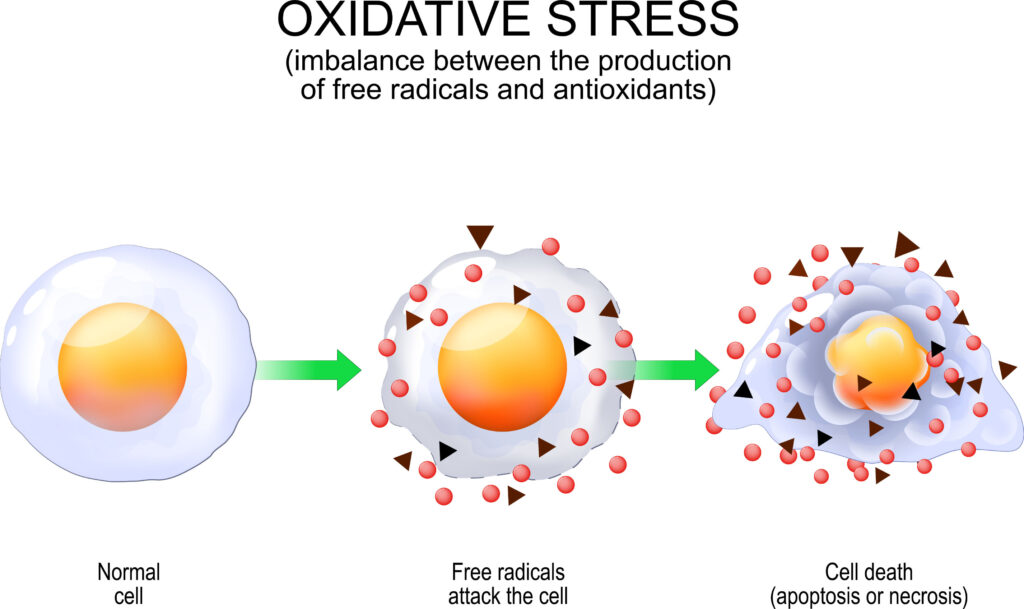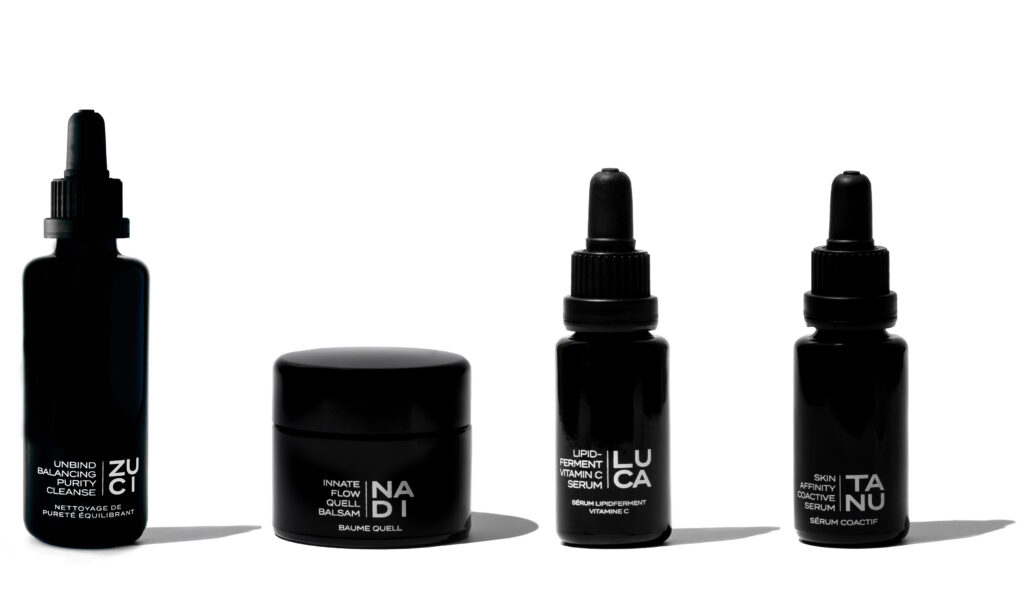Antioxidants are remarkable compounds that aren’t just another passing trend – they hold the key to unlocking radiant, youthful, and healthy skin. In this article, we’ll delve into the role of antioxidants in Skincare, exploring what they are, their transformative effects on the skin, and why your skincare routine should never be without them.
Understanding Antioxidants: Nature’s Defense Mechanism
Antioxidants are naturally occurring compounds found in various foods and skincare ingredients. Their primary role is to combat oxidative stress caused by free radicals – unstable molecules that damage cells, leading to premature aging, dullness, and a weakened skin barrier. Think of antioxidants as your skin’s loyal bodyguards, fending off these harmful free radicals and preserving your skin’s health and integrity.
Holistic skincare emphasizes the interconnectedness of health and self-care, focusing on nurturing your skin from both inside and out. Antioxidants align perfectly with this philosophy, working harmoniously with your skin’s natural processes and promoting long-term vitality. By incorporating antioxidants into your routine, you’re not only addressing current skincare concerns but also investing in the health of your skin for years to come.
Free Radicals Explained Simply
Free radicals in the context of cosmetics refer to highly reactive molecules that can damage skin cells. These molecules are usually oxygen-containing compounds and are often generated by external factors.
External Aggressors
- Air Pollution. Pollutants like car exhaust, industrial emissions, and cigarette smoke contain compounds that generate free radicals when inhaled. These free radicals can contribute to oxidative stress and damage to lung tissues.
- UV Radiation. Ultraviolet (UV) radiation from the sun can lead to the production of free radicals in the skin. These radicals can damage skin cells and contribute to premature aging, wrinkles, and even skin cancer.
- Infectious Agents. Infections and injuries trigger the body’s immune response. Immune cells called macrophages produce free radicals while fighting off invading germs. These free radicals can damage healthy cells, leading to inflammation.
- Heavy Metals. Metals such as lead, mercury, and cadmium can generate free radicals and cause oxidative stress when they accumulate in the body. This can happen through exposure to contaminated air, water, or food.
- Industrial Chemicals. Exposure to certain industrial chemicals, such as those found in paints, solvents, and cleaning agents, can result in the production of free radicals and contribute to cellular damage.
- Radiation. Ionizing radiation from sources like X-rays and certain medical procedures can generate free radicals in tissues. This can lead to DNA damage and increase the risk of cancer.
- Cigarette Smoke. Tobacco smoke is a significant source of free radicals due to the numerous chemicals it contains. Smoking leads to oxidative stress and can damage cells throughout the body.
- Pesticides and Herbicides. Certain agricultural chemicals, like pesticides and herbicides, can generate free radicals when they interact with living tissues. This can impact both the environment and human health.
- Household Chemicals. Some household cleaning products, cosmetics, and personal care items can contain chemicals that release free radicals when they interact with air or other substances.
Lifestyle Choices
- Processed Foods. Some processed foods, especially those high in unhealthy fats and additives, can lead to the production of free radicals when consumed. This oxidative stress can contribute to chronic diseases.
- Fried and Grilled Foods. Cooking foods at high temperatures, especially frying and grilling, can lead to the formation of free radicals in the food. When consumed, these radicals can contribute to oxidative stress in the body.
- Alcohol. Excessive alcohol consumption can increase the production of free radicals in the body. It can also impair the body’s ability to neutralize these radicals, leading to cellular damage.
- Strenuous Exercise. Due to increased activation of aerobic bioenergetic pathways during endurance exercise, substrate depletion and exercise-induced hyperthermia.
Free Radicals are also produced by our bodies
We produce free radicals as a naturally occurring metabolic process in other words being alive! All living organisms create and manufacture their substance and obtain energy to function – by eating and drinking, we then need to break down and “metabolise” fats, carbohydrates, and proteins into energy sources our bodies can utilise.
Sometimes imbalances with our antioxidant defences can occur resulting in unchecked free radicals, these uncontrolled free radicals absorb electrons from nearby molecules for example DNA, proteins and lipids – this is known as “Oxidative Stress”.
Oxidative Stress and Skin
Your skin is the interface between internal and external environments, and experiences additional exposure to extrinsic (external) factors research has determined that oxidative stress plays a role in the following:
1. SKIN AGING
- Alters cell proliferation and differentiation via mitogen-activated protein kinase (MAPK) pathway
- Accelerates collagen degradation and wrinkles by stimulating metalloproteinase (MMP) production
- Causes cell DNA damage
- Triggers lipid and protein oxidation
- Contributes to anti-glycation activity
- Decreases barrier function and dehydration
- Increases inflammation
2. SKIN DISORDERS
- Inflammation associated with atopic dermatitis, urticaria and psoriasis
3. BARRIER FUNCTION
- Increases inflammation
- Increases TEWL (Transepidermal Water Loss)
4. ACNE
- Increases inflammation
- Decreases barrier function
- Triggers protein and lipid oxidation.

The Wonders They Work: The Role of Antioxidants in Skincare
The benefits of antioxidants extend beyond their protective properties. When integrated into your skincare routine, they can:
- Neutralise Free Radicals – By neutralising free radicals, antioxidants prevent collagen and elastin breakdown, slowing down the formation of fine lines and wrinkles.
- Brighten Your Complexion – Antioxidants like vitamin C can lighten hyperpigmentation and promote a more even skin tone, giving you that coveted healthy glow.
- Hydrate and Nourish – Many antioxidants possess hydrating properties that fortify your skin’s moisture barrier, resulting in plump, supple skin.
- Combat Inflammation – Antioxidants, such as green tea extract and chamomile, have anti-inflammatory properties that help soothe redness and irritation.
- Boost Collagen Production – Certain antioxidants stimulate collagen production, enhancing skin elasticity and firmness.
Why Your Skin Craves Antioxidants: The Role of Antioxidants in Skincare
Holistic skincare emphasises the interconnectedness of health and self-care, focusing on nurturing your skin from both inside and out. Antioxidants align perfectly with this philosophy, working harmoniously with your skin’s natural processes and promoting long-term vitality. By incorporating antioxidants into your routine, you’re not only addressing current skincare concerns but also investing in the health of your skin for years to come.
Embracing Sustainability with Plant Sourced Antioxidants
Sustainable skincare goes hand in hand with green beauty, prioritising eco-friendly and ethically sourced ingredients. Many plant-sourced antioxidants tick both of these boxes. We understand the role of antioxidants in skincare, each FIFTY7KIND product offers potent plant-based antioxidants :
TANU Skin Affinity Coactive Serum
- Vitamin E – Often derived from sunflower oil, vitamin E is a potent antioxidant that supports skin repair and hydration.
- Green Tea Leaf Co2 Extract – Sourced from the leaves of Camellia sinensis, green tea extract is rich in polyphenols that combat inflammation and protect against environmental stressors.
- Rosehip Berry and Seed Co2 Extract. Extracted from the rosehip seeds and berry, this oil is packed with vitamin A promoting skin rejuvenation and repair.
- Sea Buckthorn Fruit and Seed Co2 Extract. Rich in vitamin A, both alpha- and beta-carotene, vitamin E, fatty acids and flavonoids, Omega 3, 6, 9 and rarest Omega 7 and about 190 bioactive compounds.
- Acaí Berry Oil. Anthocyanins: cyanidin, delphinidin, malvidin, pelargonidin, and peonidin (Açaí contains 10-30x more anthocyanins than red wine, research has shown promise for Acaí oil as an inhibitor of melanin biosynthesis (tyrosinase inhibitor) aka protecting against hyperpigmentation.
- Red Raspberry Co2 Extract. Exceptionally high in vitamins E, pro-vitamin A, and ellagic acid.
- Pomegranate Co2 Extract. Extremely high in Vitamin E and punicic acid, this is an omega-5 isomer of conjugated α-linoleic acid that has shown strong anti-oxidative and anti-inflammatory effects.
LUCA Lipid Ferment Vitamin C Serum
- Vitamin E. Often derived from sunflower oil, vitamin E is a potent antioxidant that supports skin repair and hydration.
- Astaxanthin Co2 Extract. Derived freshwater Microalgae Clinical studies show that Astaxanthin protects against environmental stressors, is a super antioxidant because it never becomes a pro-oxidant (meaning it is very stable unlike vitamin C) and penetrates both the water and lipid-soluble part of the cell, visible reduction in hyperpigmentation, wrinkle formation and collagen breakdown and visible improvements in skin elasticity and moisture content.
- Vitamin C (Ascorbyl Tetraisopalmitate). Antioxidants scavenge free radicals and protect cells, anti-inflammatory properties help reduce/lessen the occurrence of acne. Shown to exert Antioxidant effects within 30 minutes of skin application and remains active for up to 40 hours following skin application.
- Schisandra Fruit Co2 Extract. Lignans are compounds offering potent antioxidant and anti-inflammatory activity improving skin resilience and reducing redness and inflammation.
- CoQ10 – Coenzyme. Strong antioxidant effects protect the skin from environmental stressors.
ZUCI Unbind Balancing Purity Cleanse
- Black Cumin Co2 Extract. Its antioxidant activity from thymoquinone, cymene and thujene plant compounds is known to promote the skin’s elimination of harmful free radicals. Therefore diminishing the appearance of wrinkles, fine lines, dark spots, and blemishes, thereby exhibiting a rejuvenating and revitalising effect.
- Kiwi Seed Oil. Antioxidant protection from Vitamin E, Phytosterols, and Squalene to help neutralise damage caused by UV light.
- Schisandra Fruit Co2 Extract. Lignans are compounds offering potent antioxidant and anti-inflammatory activity improving skin resilience and reducing redness and inflammation.
NADI Innate Flow Quell Balsam
- CoQ10 – Coenzyme. Strong antioxidant effects protect the skin from environmental stressors.
- Acaí Berry Oil. Anthocyanins: cyanidin, delphinidin, malvidin, pelargonidin, and peonidin (Açaí contains 10-30x more anthocyanins than red wine, research has shown promise for Acaí oil as an inhibitor of melanin biosynthesis (tyrosinase inhibitor) aka protecting against hyperpigmentation.
- Black Cumin Co2 Extract. Its antioxidant activity from thymoquinone, cymene and thujene plant compounds is known to promote the skin’s elimination of harmful free radicals. Therefore diminishing the appearance of wrinkles, fine lines, dark spots, and blemishes, thereby exhibiting a rejuvenating and revitalising effect.
- Tamanu Nut Oil. Is a very rich source of compounds: pyranocoumarins, xanthones, triterpenes, bioflavonoids, as well as tocopherol and tocotrienol. Acting as antioxidants offering skin protection.
Protect your skin with Antioxidant Rich Skincare
As the world of skincare continues to evolve, one principle remains constant – by understanding the role of antioxidants in skincare, we can appreciate the importance of antioxidants in achieving healthy, radiant skin. By embracing holistic skincare and sustainable practices, you’re not only caring for your skin but also contributing to a greener and more mindful beauty industry. Each of FIFTY7KINDS’ products begins with plant-sourced, nutrient-rich, antioxidant-rich sustainable ingredients – this is the foundation of each formulation.
You are bombarded by daily exposure to both external and internal free radical-causing potential, a curse of our modern lives, this is why daily (AM and PM) application of the FIFTY7KIND product line is your daily self-defence – we have you covered literally!
Until next time, be human, be kind, be you.


References:
- Addor FAS. Antioxidants in dermatology. An Bras Dermatol. 2017 May-Jun;92(3):356-362. doi: 10.1590/abd1806-4841.20175697. PMID: 29186248; PMCID: PMC5514576. https://www.ncbi.nlm.nih.gov/pmc/articles/PMC5514576/
- Pullar JM, Carr AC, Vissers MCM. The Roles of Vitamin C in Skin Health. Nutrients. 2017 Aug 12;9(8):866. doi: 10.3390/nu9080866. PMID: 28805671; PMCID: PMC5579659. https://www.ncbi.nlm.nih.gov/pmc/articles/PMC5579659/
- Lycopene, photoprotection and skin care: The benefits of organic quality. January 2010 Journal of Plastic Dermatology 6(1):37-47 https://www.researchgate.net/publication/286888377_Lycopene_photoprotection_and_skin_care_The_benefits_of_organic_quality
- Jain, Nihali & Shukla, Rajesh & Pandey, Vikas & Shukla, Ajay & Kashaw, Sushil. (2024). CHAPTER -5 Bioactive Compounds for Skin and Beauty: Antioxidants and their Anti-Aging Effects on the Skin, Collagen Boosters and their Impact on Skin Elasticity, Natural Bioactive Compounds for Radiant and Healthy Skin. https://www.researchgate.net/publication/378010842_CHAPTER_-5_Bioactive_Compounds_for_Skin_and_Beauty_Antioxidants_and_their_Anti-Aging_Effects_on_the_Skin_Collagen_Boosters_and_their_Impact_on_Skin_Elasticity_Natural_Bioactive_Compounds_for_Radiant_a
Comments +